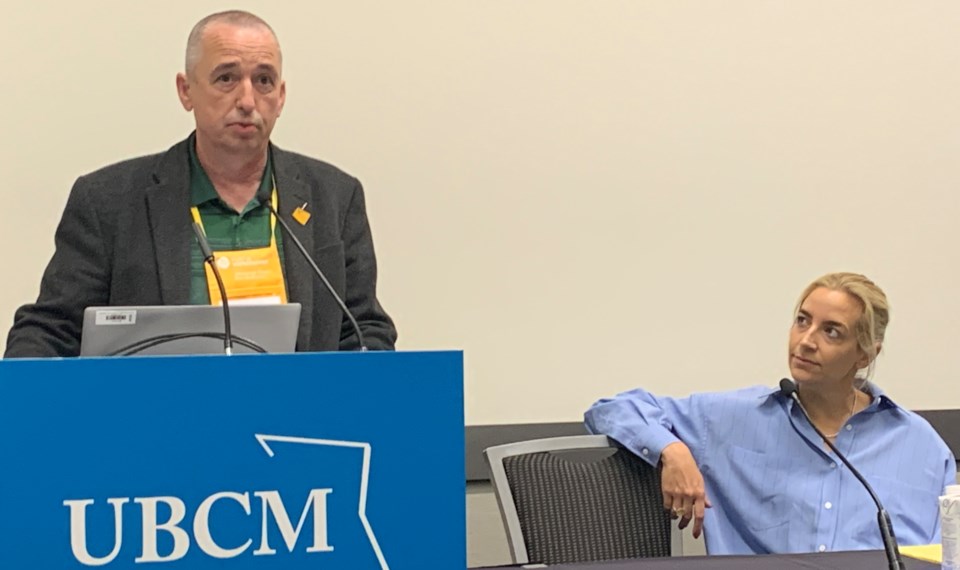Rural health care advocates believe the provincial government needs to step up to offset wait-times and overwhelming costs for people in remote areas to receive care equitable to that received in larger areas.
A panel at the Union of B.C. Municipalities conference in Vancouver told delegates costs for patients can reach into the tens of thousands of dollars out of pocket, costs that risk driving some people into poverty.
Indeed, the panel heard, one Princeton woman needing a lung transplant was saved when a philanthropist stepped up with a blank cheque for her care.
“A lot of people don’t have that option and they’re dying,” said Paul Adams, executive director of the .
“I don’t think, as British Columbians and Canadians, we should be running bottle drives and bake sales to get care,” Adams said.
Delegates heard some people have resorted to GoFundMe fundraising in order to pay for needed health care.
Adams decried the centralization of services in B.C., meaning people in rural or remote areas have to travel great distances including boat, plane and vehicles to get to health care centres.
By the numbers
Jude Kornelson, co-director for the Centre for Rural Health Research at the UBC's Department of Family Practice, said recent research indicates high costs for people needing solid organ transplants.
The research findings were published in the August 2021 report
The report found patients needing to travel to larger centres such as Vancouver for transplants were spending an average of $44,624 for the care.
“Obviously, this is a substantial amount of money," Kornelson said. “There is no option of going to a regional centre. The costs re exorbitant.”
On top of that, she said, the stress for both the patient and their care supporters is immense.
Added to that is the fact that most patients’ primary support person (65 per cent) may be a spouse.
“Complete loss of income for the family,” Kornelson said.
And, she added, coming to Vancouver and finding accommodation can be a nightmare. Patients often have hours notice once a donor organ is available.
“Heaven forbid that anyone is called for a transplant when Taylor Swift is in town,” she said, saying finding accommodation would be impossible.
What the centre is recommending is the creation of a provincial task force to find ways to help patients navigate the care system, to identify patients' needs and create health system navigators to provide oversight for patients’ journeys through the system.
The group also suggests that, instead of putting patients and support people up in hotels in a piecemeal manner, have a dedicated building near facilities such as Vancouver General Hospital or the new St. Paul’s Hospital, also in Vancouver.
Air support
The discussion included presentations from two organizations providing air services to patients in remote communities.
Lynette Lucas of (HWB) said her organization works to get medical services into remote communities so people don’t have to take time from work, spend money and travel great distances for care.
HWB will take doctors, dentists and other providers into communities so people can receive the health care they need. The group also provides food transport services.
Lucas said taking services to people means multiple people can receive care in their communities.
For example, she said, while people in large cities can easily go to a dentist and be told they need a filling and return later for such treatment, people in remote areas can have that series of treatments dealt with in one day.
And, she said, a dentist can treat multiple people per day.
Hope Air
Paul Rubinstein is the chief executive officer of , a national charitable group that works to get people from remote areas to larger centres for treatment.
He said Hope Air works with larger partners such as Pacific Coastal Air, Harbour Air and WestJet to ensure people get to the health services they need.
“No matter who you are, no matter where you go, no matter how much you have, if you need to travel to get specialty care, we’re going to make sure you get there no matter how much the cost,” he said of Hope Air’s service commitment.
Rubenstein said Hope Air will cover flights, accommodation, ground transportation and meal support.
He said Hope Air can help in ensuring people are not being drive into poverty in order to get health care.
The UBCM convention runs until Friday.


